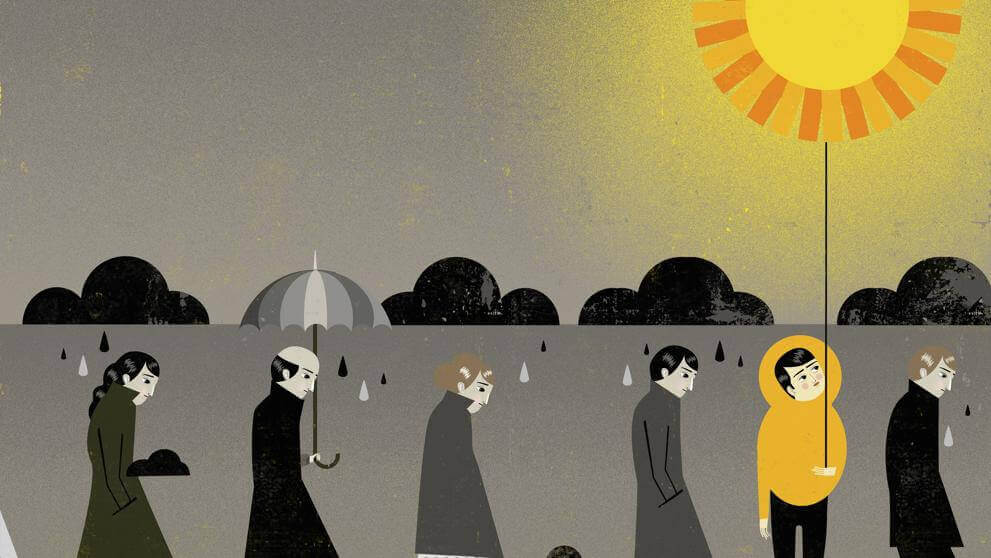For the World, I'm a Pessimist. For my People, I'm Optimistic.


Written and verified by the psychologist Sergio De Dios González
Some optimistic emotions and sensations can only be awakened by personal relationships with your family and closest friends.
Emotional support, love, security, and protection make us look at the people around us from a hopeful perspective, despite the problems that muddle the horizon.
The world can be a vile place, but the sensations of comfort provided by our people make us experience it as warm and made for us (at least in part).
When you look at the world, sometimes you notice a cacophony of situations and facts that repulse you. It makes you feel vulnerable and small in the face of so much incomprehension towards certain situations.
Sometimes, you can even see the world as a threatening place. But when you look around at your immediate surroundings, you tend to find encouragement and security. This happens for many reasons, but especially because you’re a participant through your personal relationships.
Being surrounded by people who give you a sense of security and comprehension makes you optimistic. Or it makes you adopt the perspective of an optimist since you tend to see and judge things more positively.
Not knowing how to take care of your social relationships can be harmful. As harmful as having a sedentary lifestyle, being an alcoholic, or smoking a pack a day.
“Our beliefs about what we are and what we can be precisely determine what we can be.”
-Anthony Robbins-
Why are we flooded with pessimism when we look at the world?
It’s a fact that statistics show, compared to previous eras, that the world is better off now than ever. Yet the protective tendency of the brain makes us pay closer attention to threating news, putting us in a constant state of alarm.

We’re living in an era of the least violence in human history. Poverty has been considerably reduced. The global population is evermore long-lasting, and the world, in general, has become more democratic.
Despite all of this, we often hear expressions which describe a world in continuous deterioration. “This is no longer what it used to be” or “Everything was better back in my day.” But statistics, as we have already mentioned, tell a different tale.
What is causing this dissonance between the current situation of the world and the global state of pessimism about the evolution of the planet? Steven Pinker, a professor at Harvard University, synthesizes and explains why. The main reason behind this distortion is just how powerful and insistent the pessimistic filter can be.
The human brain is programmed to first identify and pass through the conscious mind the dangers of the world. And a bit of bad news can easily put our quality of life on the line.
Instead, good news is not a threat. This is one of the reasons why the salience of negative news is greater. It also explains why, in general, bad news leaves a more profound mark on our memory.
“Pessimism is a game in the bag. You can never lose this way, only win. It’s the only point of view from which you’ll never get disappointed.”
-Thomas Hardy-
Why are we more optimistic when we look at our people?
The key is our optimistic view on life when we look at our people, at those people that we have voluntarily chosen to share our most personal experiences with, and this is based on how grateful we are to them.
The secret resides in being appreciative for all of the things our people do for us, without them really being anything out of the ordinary. These could simply be the things we take for granted.
Are we really considerate of how many people contribute to making our day-to-day lives possible? Do we know the importance of the emotions that our relationships provide?

It’s undeniable that we owe an immense acknowledgment to an infinite amount of people who make our lives possible. Or simply to the people who let us enjoy the present moment. And in order to be able to express this, we need to be aware of the good and positive things that surround us.
“I am an optimist. It does not seem too much use being anything else.”
-Winston S. Churchill-
Some optimistic emotions and sensations can only be awakened by personal relationships with your family and closest friends.
Emotional support, love, security, and protection make us look at the people around us from a hopeful perspective, despite the problems that muddle the horizon.
The world can be a vile place, but the sensations of comfort provided by our people make us experience it as warm and made for us (at least in part).
When you look at the world, sometimes you notice a cacophony of situations and facts that repulse you. It makes you feel vulnerable and small in the face of so much incomprehension towards certain situations.
Sometimes, you can even see the world as a threatening place. But when you look around at your immediate surroundings, you tend to find encouragement and security. This happens for many reasons, but especially because you’re a participant through your personal relationships.
Being surrounded by people who give you a sense of security and comprehension makes you optimistic. Or it makes you adopt the perspective of an optimist since you tend to see and judge things more positively.
Not knowing how to take care of your social relationships can be harmful. As harmful as having a sedentary lifestyle, being an alcoholic, or smoking a pack a day.
“Our beliefs about what we are and what we can be precisely determine what we can be.”
-Anthony Robbins-
Why are we flooded with pessimism when we look at the world?
It’s a fact that statistics show, compared to previous eras, that the world is better off now than ever. Yet the protective tendency of the brain makes us pay closer attention to threating news, putting us in a constant state of alarm.

We’re living in an era of the least violence in human history. Poverty has been considerably reduced. The global population is evermore long-lasting, and the world, in general, has become more democratic.
Despite all of this, we often hear expressions which describe a world in continuous deterioration. “This is no longer what it used to be” or “Everything was better back in my day.” But statistics, as we have already mentioned, tell a different tale.
What is causing this dissonance between the current situation of the world and the global state of pessimism about the evolution of the planet? Steven Pinker, a professor at Harvard University, synthesizes and explains why. The main reason behind this distortion is just how powerful and insistent the pessimistic filter can be.
The human brain is programmed to first identify and pass through the conscious mind the dangers of the world. And a bit of bad news can easily put our quality of life on the line.
Instead, good news is not a threat. This is one of the reasons why the salience of negative news is greater. It also explains why, in general, bad news leaves a more profound mark on our memory.
“Pessimism is a game in the bag. You can never lose this way, only win. It’s the only point of view from which you’ll never get disappointed.”
-Thomas Hardy-
Why are we more optimistic when we look at our people?
The key is our optimistic view on life when we look at our people, at those people that we have voluntarily chosen to share our most personal experiences with, and this is based on how grateful we are to them.
The secret resides in being appreciative for all of the things our people do for us, without them really being anything out of the ordinary. These could simply be the things we take for granted.
Are we really considerate of how many people contribute to making our day-to-day lives possible? Do we know the importance of the emotions that our relationships provide?

It’s undeniable that we owe an immense acknowledgment to an infinite amount of people who make our lives possible. Or simply to the people who let us enjoy the present moment. And in order to be able to express this, we need to be aware of the good and positive things that surround us.
“I am an optimist. It does not seem too much use being anything else.”
-Winston S. Churchill-
All cited sources were thoroughly reviewed by our team to ensure their quality, reliability, currency, and validity. The bibliography of this article was considered reliable and of academic or scientific accuracy.
Haselton, M. G., & Nettle, D. (2006). The paranoid optimist: An integrative evolutionary model of cognitive biases. Personality and Social Psychology Review. https://doi.org/10.1207/s15327957pspr1001_3
Haselton, M. G., & Nettle, D. (2006). The paranoid optimist: An integrative evolutionary model of cognitive biases. Personality and Social Psychology Review. https://doi.org/10.1207/s15327957pspr1001_3
Scheier, M. F., & Carver, C. S. (1992). Effects of optimism on psychological and physical well-being: Theoretical overview and empirical update. Cognitive Therapy and Research. https://doi.org/10.1007/BF01173489
Strunk, T. E. (2012). Pliny the pessimist. Greece and Rome. https://doi.org/10.1017/S001738351200006X
This text is provided for informational purposes only and does not replace consultation with a professional. If in doubt, consult your specialist.







